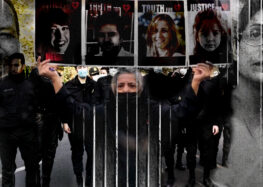Critical Deterioration in Nasrin Sotoudeh’s Health as Hunger Strike Hits Three-Week Mark
 Imprisoned Human Rights Attorney Refuses Food to Demand Release of Prisoners Endangered by COVID-19
Imprisoned Human Rights Attorney Refuses Food to Demand Release of Prisoners Endangered by COVID-19
Husband: “Nasrin has become extremely weak”
August 31, 2020—The health of imprisoned human rights lawyer Nasrin Sotoudeh has become critically threatened by a hunger strike she began on August 11, 2020 to call for the release of political prisoners severely endangered by the rapid spread of COVID-19 in Iran’s overcrowded prisons.
“Nasrin Sotoudeh is risking death in order to break through the Iranian authorities’ refusal to release political prisoners who are falling ill from the COVID-19 virus spreading through Iran’s prisons,” said Hadi Ghaemi, executive director of the Center for Human Rights in Iran (CHRI).
In an interview with CHRI on August 31, 2020, Sotoudeh’s husband, Reza Khandan said: “Nasrin has become extremely weak and her physical condition is not well. The prison clinic staff say she needs an injection of serum but Nasrin hasn’t agreed to it and refuses to take it.”
He added that despite receiving many messages from friends and activists appealing for an end to her hunger strike, Nasrin intends to continue her food protest.
“In addition to the deep injustice of political imprisonment, the Judiciary will have blood on its hands if Nasrin Sotoudeh and other political prisoners fall victim to the authorities’ total disregard for their health and well-being,” Ghaemi said.
CHRI calls on the Iranian authorities to immediately release all political prisoners for medical care and testing.
“Nasrin’s condition has become critical”
On August 26, 2020, Khandan wrote on Facebook, “We have entered the 17th day of Nasrin’s hunger strike. She has lost about six kilos of her 53 kilos of weight. Her blood pressure is erratic and her sugar level is very high. Nausea won’t let her hold enough water and sugar and that by itself is very dangerous…” A few days earlier, he had written that “Nasrin’s condition has become critical and she was transferred to the Evin Prison clinic [on August 19].
On August 22, 2020, human rights lawyer Saeid Dehghan tweeted an open letter signed by 44 lawyers, stating: “Demanding the release of political prisoners and ending restrictions on their right to parole and furlough during the current [COVID-19] crisis is certainly logical, humane and lawful… but prisoners should not risk their life and health in order to achieve them.”
Political Prisoners Falling Ill, Not Tested or Treated in Iran’s Prisons
 Sotoudeh began her hunger strike on August 11 after multiple letters she wrote to the judicial authorities about dangerous conditions surrounding political prisoners went unanswered, even as numerous prisoners tested positive for COVID-19 at Evin Prison’s Ward 8 and many more displayed symptoms.
Sotoudeh began her hunger strike on August 11 after multiple letters she wrote to the judicial authorities about dangerous conditions surrounding political prisoners went unanswered, even as numerous prisoners tested positive for COVID-19 at Evin Prison’s Ward 8 and many more displayed symptoms.
Despite several prisoners having serious underlying health conditions, almost none have received proper medical care, and only a fraction of those displaying symptoms have been tested. As there is no separation of prisoners displaying symptoms, there are grave concerns that a large number of prisoners have contracted the virus.
Iran’s political prisoners were largely left out of the country’s March 2020 mass release of prisoners, which was aimed at stemming the mounting deaths from COVID-19 in the country, which emerged as an early epicenter of the global pandemic.
Nasrin Sotoudeh is currently behind bars at Evin Prison, sentenced to 38 years in prison for her peaceful work as a human rights attorney, 12 years of which she must serve before becoming eligible for parole. Among her charges were “encouraging prostitution” for advocating against compulsory hijab and defending citizens’ right to peaceful dissent.





